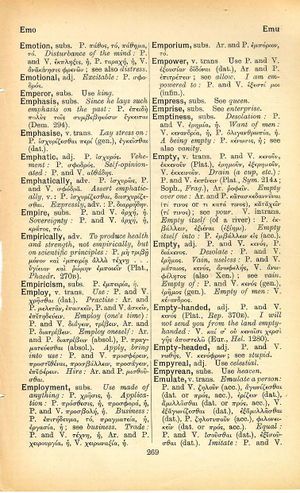emphasis
οἱ Κυρηναϊκοὶ δόξαις ἐχρῶντο τοιαύταις: δύο πάθη ὑφίσταντο, πόνον καὶ ἡδονήν, τὴν μὲν λείαν κίνησιν, τὴν ἡδονήν, τὸν δὲ πόνον τραχεῖαν κίνησιν → the Cyrenaics admitted two sensations, pain and pleasure, the one consisting in a smooth motion, pleasure, the other a rough motion, pain
English > Greek (Woodhouse)
subs.
Since he lays such emphasis on the past: P. ἐπειδὴ πολὺς τοῖς συμβεβηκόσιν ἔγκειται (Dem. 294).
Latin > English (Lewis & Short)
emphăsis: is, f., = ἔμφασις, a figure of rhet.,
I emphasis, rhetorical stress (cf.: pondus, significatio), Quint. 9, 2, 64; 8, 2, 11; 8, 3, 86 al.
Latin > French (Gaffiot 2016)
emphăsis, is, f. (ἔμφασις), emphase [rhét.] : Quint. 8, 2, 11.
Latin > German (Georges)
emphasis, eos, Akk. im, Abl. ī, f. (εμφασις), I) der Anblick, rein lat. intuitio, Chalcid. Tim. 239 in. – II) der Nachdruck-, die Kraft des Ausdrucks, der noch mehr bedeutet u. in sich ahnen läßt, als er eigentlich ausspricht, die Emphase, Quint. 8, 2, 11 u.a. Diom. 456, 29 (wo Genet.). Serv. Verg. Aen. 2, 79 u. 394: expressius cum emphasi pronuntiare, Cassian. coll. 23, 16.

